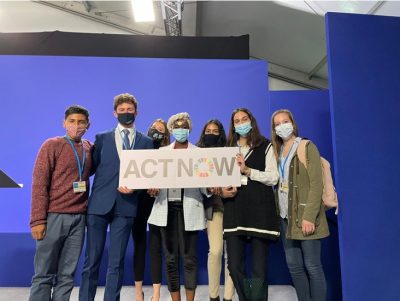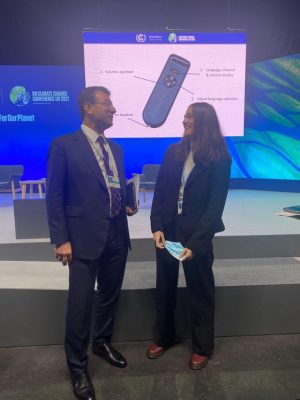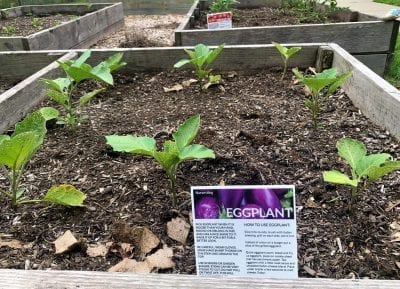by Nidhi Nair
As a young girl growing up in a coastal state called Kerala in India, I was exposed to the devastating effects of climate change from an early age. Summers were sweltering, monsoons were ferocious and floods were frequent. In 2018, as I was packing up to move to the United States, my plans were delayed because of severe floods in Kerala caused by climate change, leading to the death of nearly 500 people in my state. I watched fearfully from my window as water filled my grandmother’s farm, and as roads became rivers in the deluge. This year, these trends have continued as nearly 22 people have died from flash floods and landslides caused by anomalous rainfall.

Having grown up surrounded by the effects of climate change, I was motivated to understand and contribute to climate action, particularly climate finance, global data partnerships and R&D spending in climate research. As a student of economics, mathematics and statistics at the University of Connecticut, the opportunity to attend COP26 in Glasgow, Scotland this year was the perfect chance for me to combine these interests and learn more about the work done by a global coalition of environmental economists and policy makers.
COP26 started with a few space and timing issues, along with questions of inclusivity and representation. Many students, activists, researchers and policymakers from the Global South were not allowed to participate in the conference because of inequalities in vaccine access and cost considerations. I noticed that this led to clear differences in the number of observer passes handed out to delegates from developed countries like the United States compared to developing nations from across the globe.
Reasonably, this led to an air of despair and hopelessness among the young activists at COP26. After years of climate conferences after the seminal Paris conference, many of my fellow attendees seem to have given up on the prospect of multilateral discussions ever leading to fruitful outcomes. While this is an understandable reaction, I believe complete hopelessness about concerted climate action is impractical as there are many moving parts to global action, and compromise can only come through engaged discussion from multiple stakeholders. Beyond the global climate policy advancements made at Glasgow, the conference was a treasure trove of great ideas, conversations and discussions, and attending events hosted by scientists and grassroots organizations gave me hope for the future.
A summary of this week –
1. Events in the pavilion section of the conference included many researchers from around 70 different countries and organizations – and I tried to visit all of them! One of the best pavilion events I attended was in a section titled “All in for 1.5°” in which several small business owners with grassroots connections in six countries detailed their partnerships on climate finance. The global banks pavilion also held several interesting events throughout the week. It featured talks by representatives from the World Bank, Asian Infrastructure Development Bank, Climate Investment Funds, European Development Bank and many other financial and regulatory bodies. International development banks play a huge role in financing climate research in developing countries, where the impacts of climate change are the strongest.
2. I met Nancy Pelosi and other members of the American congressional delegation for an event titled “Gender Equity in Climate Action”. Various political leaders across the world discussed their country commitments, and I was disappointed by the symbolic and virtue signalling nature of their statements. Many representatives made empty promises to include gender based conditional requirements for the foreign aid they hand out for climate change. I thought this was inadequate and cumbersome as it handed the onus of responsibility to developing countries that are already battling the devastating consequences of climate change. On the plus side, Ecuador and Canada both discussed non-party stakeholder accountability from corporations which I saw as a positive sign.
3. An incredible event I attended was “Enhancing climate resilience for LDCs and SIDS through space data, finance mechanisms and partnerships” with speakers from Gambia, Scotland, Malawi, India and other countries. I was very impressed by the idea of a “data co-operative” to empower researchers to share their data with each other in ways that encourage innovative creation in least developed countries (LDCs) and small island developing states (SIDS). I was also inspired by Brazilian researchers who used space data to reduce indigenous vulnerabilities in the Amazon.
4. The U.S. Center also featured amazing presentations by organizations like the NOAA that detailed the U.S Climate Resilience toolkit in North Carolina, and the data analysis behind American climate action. Climate resilience in the United States is a fascinating topic that is more pertinent today than ever before, and I am glad that the U.S. Center emphasized the work that environmental economists are doing in building data tools to strengthen vulnerable communities.
As a cautious optimist, despite the many flaws associated with COP26, I left the conference more determined, hopeful and educated about the steps I can take to battle drastic climate change. COP26 was one of the most incredible weeks of my life, and I am more motivated than ever to pursue a career as an economist and to work on domestic economic policy that identifies financing gaps in underserved communities, and helps to strengthen vulnerable groups in the United States.




 Mexican-Chilean activist and member of the Otomi-Toltec Nation. She is from San Pedro Tultepec, Mexico, where she was rais
Mexican-Chilean activist and member of the Otomi-Toltec Nation. She is from San Pedro Tultepec, Mexico, where she was rais Xiuhtezcatl Martínez is a nineteen-year old activist who wrote a book entitled We Rise: The Earth Guardians Guide to Building a Movement That Restores the Planet. His book examines the failures of world leaders to solve the climate crisis and suggests tangible steps that youth can take to mobilize their communities. Martínez is a youth director for
Xiuhtezcatl Martínez is a nineteen-year old activist who wrote a book entitled We Rise: The Earth Guardians Guide to Building a Movement That Restores the Planet. His book examines the failures of world leaders to solve the climate crisis and suggests tangible steps that youth can take to mobilize their communities. Martínez is a youth director for  by volunteering during Barack Obama’s first presidential campaign. She studied political science at the University of Nevada Las Vegas, and has worked with advocacy groups such as Mi Familia Vota. Lorenzo frequently mentions that conservation is an inherent part of Latinx culture. While families are motivated to save money, there is an added benefit of reusing and wasting less. Lorenzo worked on environmental justice programs through
by volunteering during Barack Obama’s first presidential campaign. She studied political science at the University of Nevada Las Vegas, and has worked with advocacy groups such as Mi Familia Vota. Lorenzo frequently mentions that conservation is an inherent part of Latinx culture. While families are motivated to save money, there is an added benefit of reusing and wasting less. Lorenzo worked on environmental justice programs through  Solimar Fiske is an activist who uses her
Solimar Fiske is an activist who uses her  is a Puerto Rican and Mexican marine biologist and the founder of Fins United. The Fins United Initiative teaches people of all ages about
is a Puerto Rican and Mexican marine biologist and the founder of Fins United. The Fins United Initiative teaches people of all ages about 
